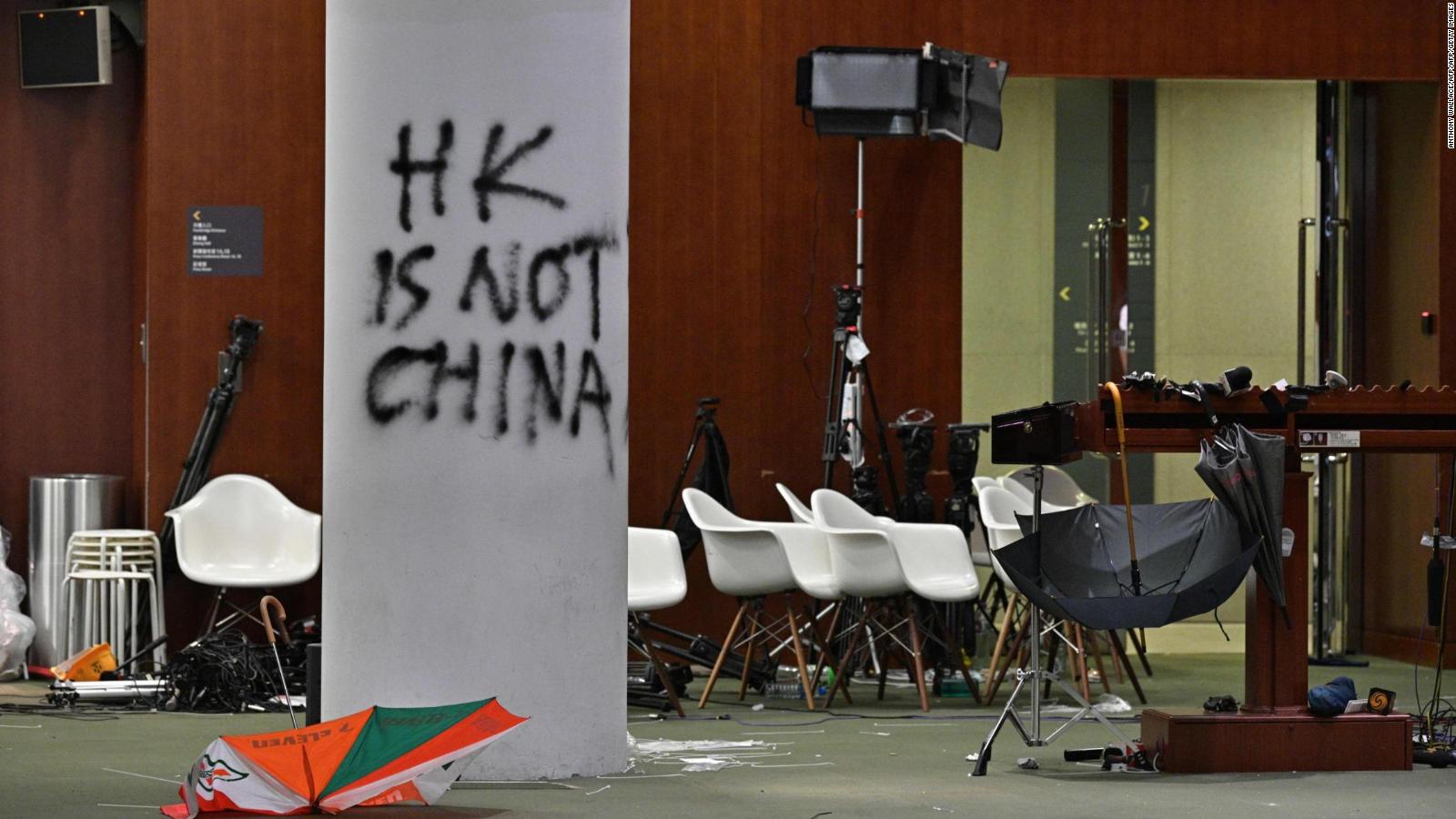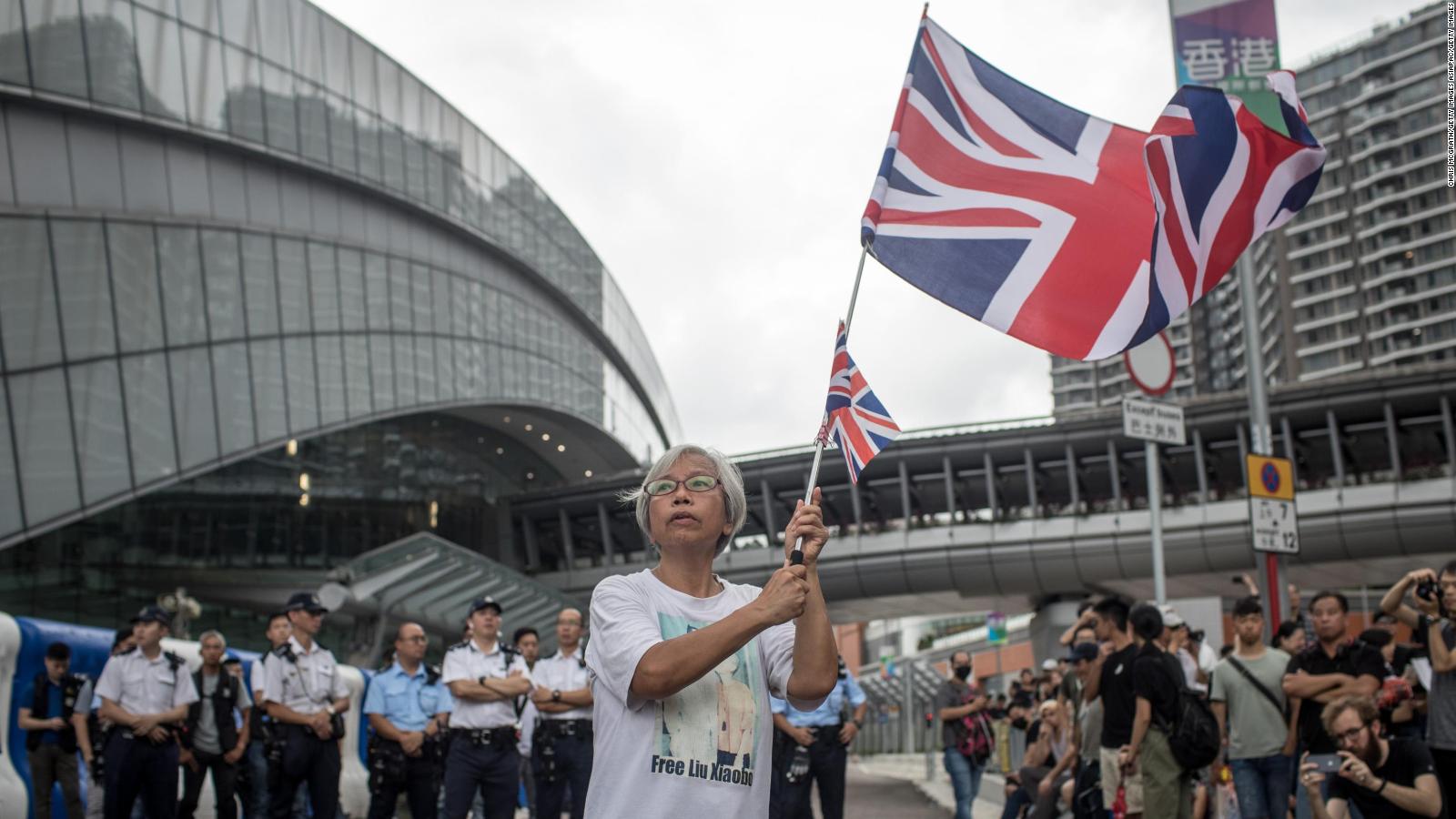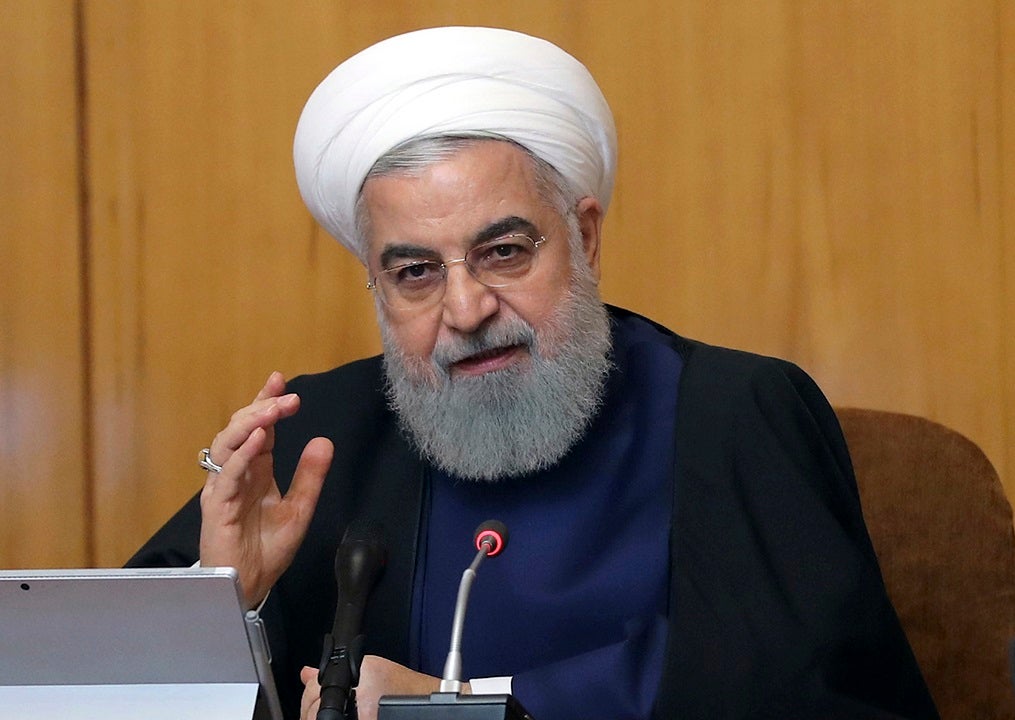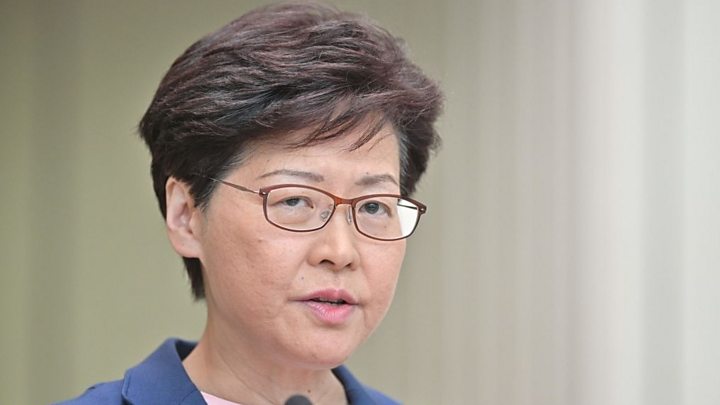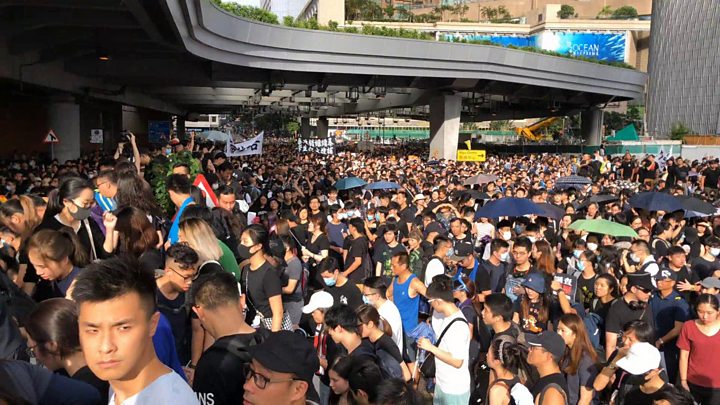"You're criticizing my friends, saying we're all radicals, saying we're criminal triads," he says, voice raised, as an older relative gestures for him to sit down. "You dare to call us triads?"
It's an inter-generational spat that has played out in many families across Hong Kong over the past month, as violence and unrest rocked the city. Family WhatsApp chat groups have descended into political shouting matches. Friends and relatives have publicly clashed in Facebook posts.
While a wide spectrum of people oppose or feel conflicted about the bill, and support the broader pro-democracy demands of the July 1 protesters, loose generational lines have emerged.
The more extreme anti-bill, pro-democracy protesters tend to be younger -- millennials and even teenagers -- while the pro-government camp leans toward the older generation.
In some ways, these generational political lines look familiar. Similar divides have been seen regarding the Brexit issue in Britain and the Trump presidency in the United States.
As in those countries, discontent in Hong Kong has been building for years, since the 2014 Umbrella Revolution which called for greater democracy, and perhaps even before.
The extradition bill was simply the last straw, exposing -- and deepening -- a rift in Hong Kong society than runs far deeper than a single piece of law.
The world's most unaffordable housing
Young Hong Kongers belong to one of the most expensive cities in the world, but they can't afford to live in it -- or, at least, not to the same standard they feel their parents' generation could.
Today, Hong Kong is a city where the race for success starts at birth. Top kindergartens and private elementary schools are so competitive that children as young as 3 years old have resumes, padded with artistic and musical achievements, and sports class attendance. Primary and secondary school students spent up to 55 hours a week in class, extra lessons, or studying, according to
a 2018 government report.
It doesn't get easier once students hit college. Take 28-year-old Wilson Lau. In 2013, he got his undergraduate degree in quantity surveying from City University of Hong Kong.
Then, while still paying off his student loans, he juggled a Bachelor of Science program, which he felt was vital for future career advancement, and a full-time job as a quantity surveyor. Many days, he didn't get off work until 9 p.m. or 10 p.m. -- then it was time to hit the books and study for exams.
That first job as a quantity surveyor had a starting monthly salary of $1,670 (HK$13,000) -- compared to an average base salary of $6,335 a month in New York for the same position, according to
Glassdoor.
But despite the comparatively lower graduate wages in Hong Kong, rent is higher here than almost anywhere else in the world, according to public policy firm
Demographia. With his student loans and low salary, Lau couldn't afford to move out of his parents' home for four or five years after he began working.
As the city's population expands and developable land
runs out, housing prices have skyrocketed -- the median price of a home in 2018 was nearly 21 times the city's median annual household income. Hong Kong has gained a reputation for its luxury real estate with staggering price tags -- one house on The Peak, an exclusive neighborhood, is
listed for $448 million.
Housing costs have risen so much faster than annual wages that young people feel priced out.
"This generation of young people in Hong Kong, in their 20s, is facing very high pressures in society," said Lau, who attended this month's protests. "Their living expenses are a huge burden. It takes up a huge part of their salaries."
Chan Ka-yan, a 28-year-old administrator at a non-profit organization, shared a relatively cheap apartment with two flatmates after she graduated and started working. But then, her flatmates left Hong Kong, and she had to find a new place on her own.
She ended up in a subdivided flat -- a small apartment split into even smaller rentable rooms. For nine months, she lived in a 100-square-foot room for $576 (HK$4,500) a month. The air conditioner leaked water. The neighboring room, also 100 square feet, had a newborn baby that cried constantly.
"Living there, there were a lot of problems," she said -- but her plight was "pretty common" for a young Hong Konger. She has since moved back in with her parents.
For young people, buying a house seems like an impossibility -- just renting an apartment is difficult enough. As they watch prices rise around them, unable to keep up with meager salaries, a feeling of being stuck has emerged.
That atmosphere is a stark contrast to their parents' generation, when opportunity and upward mobility seemed almost guaranteed.
The older generation "had hope"
The generation that grew up between the 1970s and '90s could "realize their dreams," said Edmund Cheng, deputy director of the public policy research center at Hong Kong Baptist University.
"When we talk about the Hong Kong Dream, it's another iteration of the American Dream -- they work hard and they can get rewarded," said Cheng.
These dreams were attainable in concrete ways, he added. People in the '70s could buy an apartment after working for three to five years, buy a car, and pay off their mortgage within 10 years, according to Cheng, because wages and property prices were more aligned.
For example, Jimz, a 44-year-old Hong Kong resident who declined to give his full name, bought his first home when he was 28 -- a rare feat today. He had no partner or flatmate, earned about $2,560 (HK$20,000) a month, and bought the apartment for about $128,035 (HK$1 million). That same space is now worth five times more, he said.
"Back then, if you were determined to get a house, whether it was subsidized by the government or in the private sector, it was not that unrealistic compared to these days," Jimz said.
The older generation had a few distinct advantages, said Cheng. Public schools meant good education was easily accessible. The opening up of China's economy in 1978 created new jobs for Hong Kong's lawyers, bankers, and industry experts. The population was smaller, housing was cheaper, and other costs like school fees hadn't yet reached today's exorbitant prices.
Then over the years, China became a superpower economy and relied less on Hong Kongers' expertise. More schools privatized, making elite education a luxury for the wealthy. Job competition became fierce -- for instance, Cheng said, to get a high-paying position in finance or tenure at a university, candidates only have a good shot if they attended top universities in the US or UK.
The older generation "had hope, because they could anticipate rising income over the years," said Cheng -- with new opportunities and a flourishing economy, they could expect promotions and pay raises down the line. "But now, Hong Kong's younger generation basically doesn't have this kind of hope," he added.
The wealth divide has also deepened, with low-income families unable to afford the private schools, tutors, and overseas universities that give graduates an edge in the job market.
"The poverty gap is getting wider and wider, even though the government keep saying they're trying to improve," said Venus Wong, 27, who works in marketing and joined the protests in June.
"They (the government) are launching a lot of different policies, but I don't think it actually helps a lot, and the pricing of housing keeps going up."
A question of identity
Stagnant wages and high housing costs are not unique to Hong Kong, but the generational divide here cuts deeper than economic factors. As a semi-autonomous city, Hong Kong itself has a splintered identity -- it is both China, and not.
When Britain handed sovereignty of Hong Kong back to China in 1997, it was agreed that the city would operate under a "
one country, two systems" model. As such, Hong Kong has its own legal system, currency, and police force -- as well as historical, cultural, and lifestyle differences to the mainland.
These differences have created a sense of disconnect with China, particularly among young people. Today, the number of people identifying as Hong Kongers rather than Chinese has hit a record high since 1997, according to the Hong Kong University
Public Opinion Program.
For some, this disconnect is irreparable. When protesters stormed the Legislative Council (LegCo) on July 1, they spray-painted slogans on the walls, including the phrase, "HK is not China."
Though some in the older generation also identify as Hong Kongers, many instead identify as Chinese and call China their motherland. After all, a sizable number of their own parents came from China -- in the 1940s, a huge wave of mainland emigrants fled the Chinese Civil War to Hong Kong. From 1946 to 1956, the city's population jumped from 1.55 million to 2.677 million, according to a 1969 report by Hong Kong's Census and Statistics Department.
"To me, I feel Hong Kong is part of China," said Tony Lau, 58, who works in real estate investment and development. "You can't choose your fate -- you can't say, 'I want to be American' or 'I want to be British.' Because of Hong Kong's history, you are a part of China."
He also feels closer to the mainland because, in some ways, he and his peers owe their economic success to China. "When China opened up in 1978, Hong Kong's opportunities came," he said.
As China's economy boomed and transformed the country's global image into one of power and wealth, older Hong Kongers may have felt greater pride toward the mainland, according to Cheng.
The dichotomy between being a Hong Konger and Chinese also encompasses the larger conflict between the two generations' values. Hong Kong has protected freedoms of speech, press, and assembly -- which young protesters guard fiercely and see as fundamental to Hong Kong's DNA.
In recent years, they've clung to these freedoms even more tightly amid a growing mistrust of the government and the perception that China is encroaching on Hong Kong's autonomy.
These fears were fueled by a string of controversies -- like
the disqualification of several pro-democracy lawmakers in 2017, and now
the extradition bill.
"We thought the LegCo system was our last barrier protecting the rule of Hong Kong, on our own," said Wong, the 27-year-old marketing employee who joined the protests. "But during these years, because of the disqualification of the LegCo members, it felt like we were losing our very last barrier. And we have no way to defend ourselves from China."
Older Hong Kongers often respond in one of several ways. Some are ambivalent toward the pro-democracy rhetoric; some are supportive, but disapprove of the protesters' methods; and some feel that China has been unfairly demonized.
Tony Lau also criticized the young protesters' frequent use of a Union Jack or Hong Kong's colonial-era flag as a symbol for the fight for democracy. His generation had actually lived in colonized Hong Kong, he said, arguing that young people are ignorantly romanticizing Britain as a paragon of democracy.
"People didn't start even talking about democracy until after the handover," said Lau. "In those 155 years of colonization, did they talk about universal suffrage? It was totally a colonial administration."
Millennials like Wong and Wilson Lau disagree -- after all, they were also born before the handover, and witnessed the transfer of sovereignty.
The colonial administration "wasn't a complete or perfect government. But Britain and China, their difference is huge," said Wilson Lau, who added that his colonial-era education taught him the importance of "freedom, the right of speech, liberty."
Almost by definition, revolution threatens stability. In Hong Kong, this tension reveals another deep difference in generational values.
Among older Hong Kongers, a common refrain is that the protesters can do what they like as long as they don't infringe on people's right to daily life -- a line they have long crossed by occupying streets, stopping traffic, and blocking entrances to tax and immigration offices.
The young protesters understand why older Hong Kongers resent the chaos -- but these complaints ring hollow for many who say the present social difficulties were absent in their parents' generation.
"We won't blame the older generation for earning more than us, but the older generation will blame us for pursuing democracy," said Wilson Lau. "I think it's very unfair."
A looming deadline
The conflict has permeated daily Hong Kong life. Across the city, you can hear people talking and arguing about it on public transport, hiking trails and social media.
Amid all this uncertainty and division, a clear and concrete deadline looms. In 2047, Hong Kong will be fully reintegrated with mainland China, as per the terms of the handover agreement.
Some older Hong Kongers such as Tony Lau welcome this date, pointing to the rapid economic development of Chinese megacities like Shenzhen and Shanghai. To reintegrate would open up opportunities and boost Hong Kong's growth, they argue.
Even some moderates and millennials agree. A 26-year-old Hong Konger, who declined to be named for fear of jeopardizing her job, empathized with the protesters -- but said reintegration with China was "set in stone."
"You can tell by the infrastructure they built, the bridges that are linking us to the greater Pearl (River) Delta, the high speed rail -- all these transport infrastructure are indicative that it's going to happen," she said. "It's probably time for Hong Kong to really come to terms with that ... We do need to move forward."
It's not that the young protesters don't acknowledge this deadline. On the contrary, the reality of reintegration feels so immediate they say its effects are already visible -- and it scares them on an almost existential level.
"Our generation is feeling like we don't have to wait to 2047 until we're returned to China because, systematically, we're getting closer and closer to China," said Wong.
"We fear that we are becoming part of China, but we don't want to."
CNN's Natalie Leung and Maisy Mok also contributed to this report.


